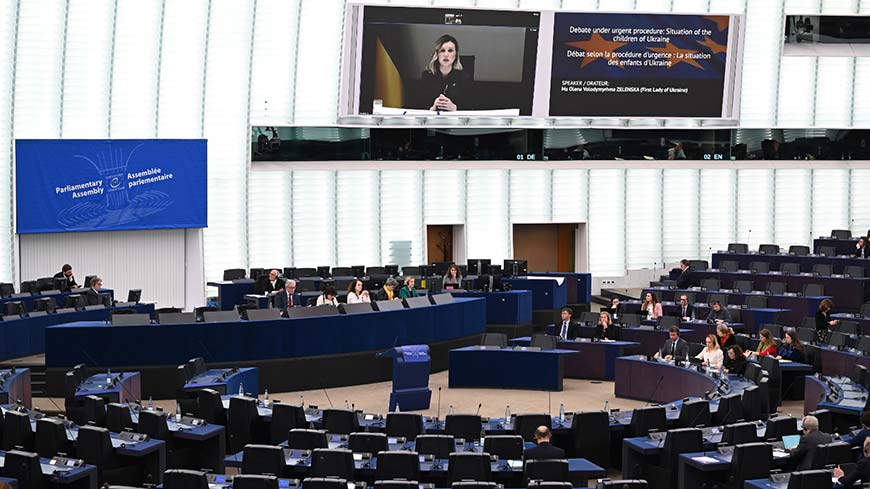Following an urgent debate, PACE unanimously adopted a resolution based on the report by Olena Khomenko (Ukraine, EC/DA) underscoring the urgent need to address the situation and fate of Ukrainian children forcibly transferred and deported to the temporarily occupied territories of Ukraine, the Russian Federation, and Belarus. As of today, the Ukrainian Government's “Children of War” platform has collected information on more than 19,546 children reported as deported or forcibly transferred from various locations, only 388 of whom have returned home, the resolution states.
Addressing the Assembly, Ukraine’s First Lady Olena Zelenska asked national parliaments “to join in order to force Russia to comply with at least the Geneva Conventions and immediately provide comprehensive lists with the names and whereabouts of all Ukrainian children who have been illegally deported”. Every rescued child “is a special operation involving many countries and dozens of people who care. That’s how we succeed. And there are dozens of caring countries and millions of caring people in the world. At least I believe in this,” she added.
The adopted text reiterates that “all Ukrainian children have the right to enjoy the rights and freedoms enshrined in relevant international human rights instruments” and emphasised that “the best interests of the child must prevail in all decision-making processes concerning them”, reinforcing the principle that children should never be used as “a means of exerting pressure or as war trophies”.
The Assembly, therefore, called on national parliaments to adopt resolutions recognising these crimes as genocide, and the international community to collaborate with Ukraine to trace and repatriate missing children, namely “to identify, locate and return them to Ukraine”.
Expressing gratitude to Council of Europe member states that have assisted Ukrainian children, the parliamentarians called for support, urging host countries to provide essential services, including education, healthcare and mental health support, and encouraged the maintenance of connections with their language and culture to facilitate their future return to Ukraine.
They highlighted the need for increased co-operation among existing parties and mechanisms, relying in particular on third-party intervention to collaboratively work towards the return of children. They called on the various organisations whose neutrality-based mandates allows them to gain access to the territories of the Russian Federation, Belarus, and occupied territories of Ukraine “to contribute to the process of identification, location and repatriation of deported and forcibly transferred Ukrainian children and to work closely with Ukraine and all States which could facilitate the return of children”.
Finally, PACE reiterated its commitment to continuing its role as a facilitator to support the Ukrainian authorities and various international organisations, such as the ICRC, in “determining the most rapid means to identify and facilitate an effective search for children” with access to as much information as possible about their identity and the conditions of their deportation or forcible transfer by the Russian Federation.


